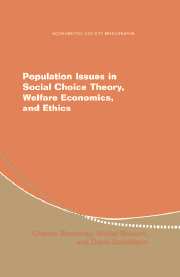Book contents
- Frontmatter
- 1 Introduction
- 2 Measurement of Individual Well-Being
- 3 Welfarist Social Evaluation
- 4 Fixed-Population Principles
- 5 Population Principles
- 6 Characterizations and Possibilities
- 7 Uncertainty and Incommensurabilities
- 8 Independence of the Existence of the Dead
- 9 Temporal Consistency
- 10 Choice Problems and Rationalizability
- 11 Applications
- References
- Author Index
- Subject Index
4 - Fixed-Population Principles
Published online by Cambridge University Press: 05 January 2013
- Frontmatter
- 1 Introduction
- 2 Measurement of Individual Well-Being
- 3 Welfarist Social Evaluation
- 4 Fixed-Population Principles
- 5 Population Principles
- 6 Characterizations and Possibilities
- 7 Uncertainty and Incommensurabilities
- 8 Independence of the Existence of the Dead
- 9 Temporal Consistency
- 10 Choice Problems and Rationalizability
- 11 Applications
- References
- Author Index
- Subject Index
Summary
Part A
In this chapter, we present the most commonly used anonymous social-evaluation orderings for fixed populations. Many of the social-evaluation orderings discussed in this chapter have been proposed or investigated in the literature on the measurement of income inequality. We have modified those orderings so that they rank vectors of well-being. Each of the modified orderings can be used to define a welfarist principle for social evaluation.
Although we focus mainly on the properties of social-evaluation orderings, we also investigate the relationship between these orderings and indexes of utility inequality. We show that all social-evaluation orderings that satisfy a few basic assumptions provide a trade-off between average utility and inequality as measured by an index. In addition, we show that orderings of average-utility inequality pairs, where inequality is measured by an index applied to utility levels, are equivalent to social-evaluation orderings.
The utilitarian ordering is insensitive to inequality of well-being (but not to inequality of income or consumption) and, for that reason, it has been rejected by some. There are several classes of inequality-averse social-evaluation orderings, however, that give priority to the interests of people with low levels of wellbeing. Some members of the generalized utilitarian and generalized Gini classes as well as the maximin and leximin (lexicographic maximin) orderings have this property.
- Type
- Chapter
- Information
- Publisher: Cambridge University PressPrint publication year: 2005



